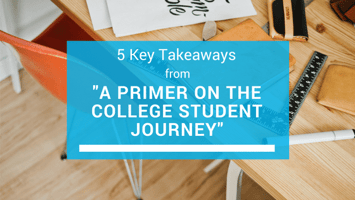According to a 2015 report by Babson Research, the number of college students currently enrolled...
A Look at the Top 5 Ranked Institutions for First-year Experience
.png?width=1200&length=1200&name=Untitled%20design%20(58).png)
Years of research have shown that students’ participation in a first-year experience program can directly increase persistence and retention rates at higher education institutions. First-year experience programs not only influence academic success, but they also drive emotional support and connections that are key to student success as a whole throughout a college education.
So what makes a first-year program successful? In the guide “Challenging & Supporting The First-Year Student: A Handbook for Improving The First-year of College”, the authors suggest that first-year success can be measured by a students’ progress towards academic and intellectual competence, establishing interpersonal relationships, exploring their identity, deciding on a career path, maintaining personal wellness, contributing to the community, and dealing with diversity. Because this definition of success touches on so many different aspects of a student’s life, first-year experience programs are designed to not only introduce students to the academic world of higher education, but also the community and environment where they will spend their next four (or more) years.
While orientation programs are a great way to get students introduced to a new institution, they really only touch the tip of the iceberg. For this reason, many schools build out a robust first-year experience program to support students and get them further connected with fellow classmates and faculty. According to the National Resource Center, 90% of institutions offered a first-year seminar in 2012. In 2017, US News & World Report set out to find top-notch examples of first-year experiences across the US. They invited college presidents, chief academic officers, deans of students, and deans of admissions to nominate up to 10 institutions with great first-year experience programs. Below, we’ve listed the top five institutions that were mentioned most often, and the unique programming they offer to make their first-year experiences stand out.
Elon University (#1)
Elon University’s First Summer Experiences program offers incoming students a chance to connect, prepare themselves their new journey, and get their first taste of experiential learning. They offer a variety of different options like white-water rafting, backpacking, participation in community service projects, and more. One unique offering involves a 5-day program that encourages students to think innovatively, centered on the philosophy “think globally, act locally”.
Many universities offer a first-year seminar program, but Elon does a great job of creating a unique theme and purpose for their seminar. Rooted around the idea of engaging globally, their First-year Foundations program includes a “global experience” course, as well as a writing course and statistical reasoning course to ensure all students can think critically and communicate effectively.
Princeton University (#1)
Princeton created a website dedicated to showing first-year students everything they need to know about the programs tailored to them, and how they can get involved. Their focus on class unity and small group experiences has led to their first-year experience program being recognized nationally. Instilling a sense of “class pride” not only helps bond first-year students to each other, but it also creates a lasting relationship between students and the university.
As we mentioned above, first-year seminars are pretty common among colleges and universities. However, ensuring that you are creating the best experience during these seminars is crucial to contributing to an overall great first-year experience. At Princeton, 75 different seminars are offered on a wide range of topics like “Life on Mars” or “Underworlds” – which takes students through the role of underworlds from “Odyssey” to “The Sopranos”. By offering such a wide range, it can not only appeal to the variety of interests among students, but it also allows them to have very small class sizes of 15, allowing for a more intimate learning experience.
Williams College (#1)
When you’re welcoming a new student to your college or university, you shouldn’t be welcoming only them, but their family as well. For first-generation college students, this is the first time their family is experiencing this journey. To ensure the family is fully involved in the process, Williams College created a website dedicated to communicating with first-year families. Instead of relying on their student to relay the message, families are able to browse through important dates, resources for moving and helping their student get situated, and even tips on how to help students make the most out of their Williams experience.
First-year students come from a wide range of backgrounds, and for some, the idea of a supportive advising program might not have existed before they arrived at college. At Williams, it offers a First-Year Advising Academic Program, that helps students become familiar with the college learning environment, helps them discover what pathways they are interested in, and matches them with an advisee with similar interests. By intervening with support early on, retention and graduation rates benefit greatly.
Butler University (#2)
Common reading initiatives, like Butler University’s Common Reading Program, have become a best practice among first-year experience programs. At Butler, this program gives students an opportunity to “intellectualize orientation through a shared experience for all first-year students and for participating faculty”. It helps to get students the intellectual mindset that they will start to engage through their college career, and gives students a talking point to connect with faculty on.
Community involvement has proven to increase retention rates, improve students’ college experience as a whole, and improve graduation rates. At Butler, students must take a course in any part of the University that involves active engagement with the Indianapolis community, as part of the Indianapolis Community Requirement. In this course, students engaged in learning that involves Indianapolis community partners and fosters a commitment to ongoing community engagement. For some students, this is the launching point that connects them with community involvement that they’ll participate in throughout their entire college career.
Yale University (#3)
For many students, the biggest adjustment in coming to college is the brand new living experience that a large majority of students have never experienced before. Moving away from a childhood home can be a big adjustment, and college and universities are doing their part to make that transition more comfortable. Yale’s First-Year Scholars program offers a group of incoming students the opportunity to engage in the campus culture before school starts by having students live and study for five weeks on campus during summer. This program allows first-year students to not only become familiar with the campus and resources before school officially starts, but it also gives them a chance to explore the community and town.
Orientation programs exist at almost every institution across the U.S., and for many, they are mandatory for students. While orientation is one the best ways to introduce students to their new environment, some universities like Yale have developed pre-orientation programs as a way to further develop relationships before students’ first-year at college begins. Their pre-orientation programs include topic themes like cultural resources, exploring the community outside of campus, and even a 5-day farming and camping trip called “Harvest”, where students experience all aspects of farming life and get to know each other through games.
Common Aspects of Successful First-Year Experience Programs
After taking a look at the institutions that were mentioned most often for having the best first-year experience for students, it’s clear to see there are some commonalities among the programs.
- Cross-Disciplinary Courses
Successful first-year seminars give students a wide range of choices so that they are able to engaged in a topic that most likely isn’t their area of study.
- Community Engagement
The top-ranked first-year experience programs not only focus on prepping students for their new academic environment, but also for their new community. By getting acclimated and contributing to the community early on, students are more likely to feel attached and “at home” in their new environment.
- Digital Resources
Incoming students receive hundreds of different communications from various departments between the time they are accepted and the time they step foot on campus. By including all important information in a digital guide that can be easily accessed, students and families can get a better grasp of what they need to do to prepare.
- Specialized Advising
The first year of a student’s college career helps to set the pace for the rest of their education. Some students may be coming from backgrounds where advisors weren’t a huge factor in their education, or were non-existent. By developing an advising program aimed at supporting first-year students’ needs, students can get the support they need early on.
- Relationship-building
Personal relationships amongst both peers and faculty have proven to increase student retention rates and further anchor them to an institution. By creating environments for students to start that process early on, like pre-orientation trips, students can start to form important bonds before school has even started.



